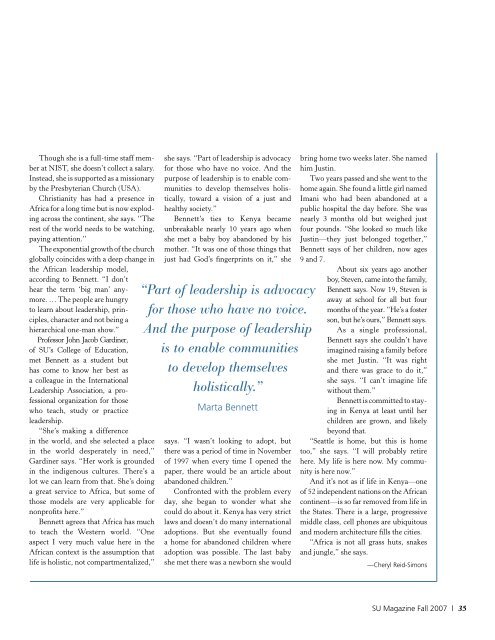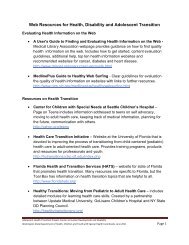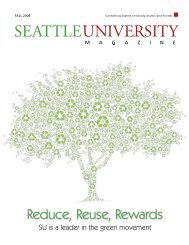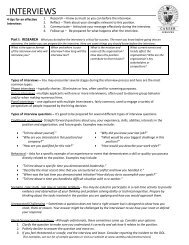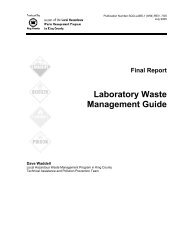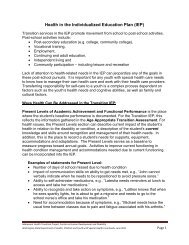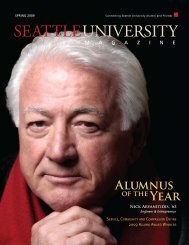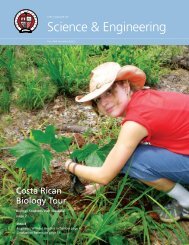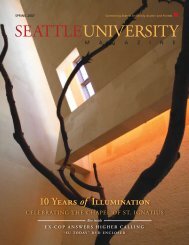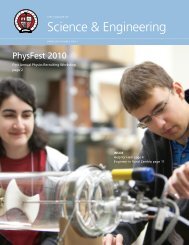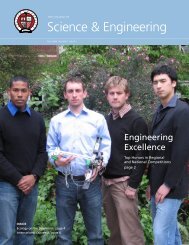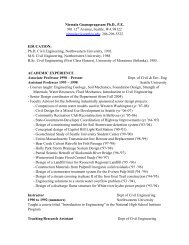Assessing How We Define Diversity - Seattle University
Assessing How We Define Diversity - Seattle University
Assessing How We Define Diversity - Seattle University
Create successful ePaper yourself
Turn your PDF publications into a flip-book with our unique Google optimized e-Paper software.
Though she is a full-time staff member<br />
at NIST, she doesn’t collect a salary.<br />
Instead, she is supported as a missionary<br />
by the Presbyterian Church (USA).<br />
Christianity has had a presence in<br />
Africa for a long time but is now exploding<br />
across the continent, she says. “The<br />
rest of the world needs to be watching,<br />
paying attention.”<br />
The exponential growth of the church<br />
globally coincides with a deep change in<br />
the African leadership model,<br />
according to Bennett. “I don’t<br />
hear the term ‘big man’ anymore.<br />
… The people are hungry<br />
to learn about leadership, principles,<br />
character and not being a<br />
hierarchical one-man show.”<br />
Professor John Jacob Gardiner,<br />
of SU’s College of Education,<br />
met Bennett as a student but<br />
has come to know her best as<br />
a colleague in the International<br />
Leadership Association, a professional<br />
organization for those<br />
who teach, study or practice<br />
leadership.<br />
“She’s making a difference<br />
in the world, and she selected a place<br />
in the world desperately in need,”<br />
Gardiner says. “Her work is grounded<br />
in the indigenous cultures. There’s a<br />
lot we can learn from that. She’s doing<br />
a great service to Africa, but some of<br />
those models are very applicable for<br />
nonprofits here.”<br />
Bennett agrees that Africa has much<br />
to teach the <strong>We</strong>stern world. “One<br />
aspect I very much value here in the<br />
African context is the assumption that<br />
life is holistic, not compartmentalized,”<br />
she says. “Part of leadership is advocacy<br />
for those who have no voice. And the<br />
purpose of leadership is to enable communities<br />
to develop themselves holistically,<br />
toward a vision of a just and<br />
healthy society.”<br />
Bennett’s ties to Kenya became<br />
unbreakable nearly 10 years ago when<br />
she met a baby boy abandoned by his<br />
mother. “It was one of those things that<br />
just had God’s fingerprints on it,” she<br />
“Part of leadership is advocacy<br />
for those who have no voice.<br />
And the purpose of leadership<br />
is to enable communities<br />
to develop themselves<br />
holistically.”<br />
Marta Bennett<br />
says. “I wasn’t looking to adopt, but<br />
there was a period of time in November<br />
of 1997 when every time I opened the<br />
paper, there would be an article about<br />
abandoned children.”<br />
Confronted with the problem every<br />
day, she began to wonder what she<br />
could do about it. Kenya has very strict<br />
laws and doesn’t do many international<br />
adoptions. But she eventually found<br />
a home for abandoned children where<br />
adoption was possible. The last baby<br />
she met there was a newborn she would<br />
bring home two weeks later. She named<br />
him Justin.<br />
Two years passed and she went to the<br />
home again. She found a little girl named<br />
Imani who had been abandoned at a<br />
public hospital the day before. She was<br />
nearly 3 months old but weighed just<br />
four pounds. “She looked so much like<br />
Justin—they just belonged together,”<br />
Bennett says of her children, now ages<br />
9 and 7.<br />
About six years ago another<br />
boy, Steven, came into the family,<br />
Bennett says. Now 19, Steven is<br />
away at school for all but four<br />
months of the year. “He’s a foster<br />
son, but he’s ours,” Bennett says.<br />
As a single professional,<br />
Bennett says she couldn’t have<br />
imagined raising a family before<br />
she met Justin. “It was right<br />
and there was grace to do it,”<br />
she says. “I can’t imagine life<br />
without them.”<br />
Bennett is committed to staying<br />
in Kenya at least until her<br />
children are grown, and likely<br />
beyond that.<br />
“<strong>Seattle</strong> is home, but this is home<br />
too,” she says. “I will probably retire<br />
here. My life is here now. My community<br />
is here now.”<br />
And it’s not as if life in Kenya—one<br />
of 52 independent nations on the African<br />
continent—is so far removed from life in<br />
the States. There is a large, progressive<br />
middle class, cell phones are ubiquitous<br />
and modern architecture fills the cities.<br />
“Africa is not all grass huts, snakes<br />
and jungle,” she says.<br />
—Cheryl Reid-Simons<br />
SU Magazine Fall 2007 | 35


